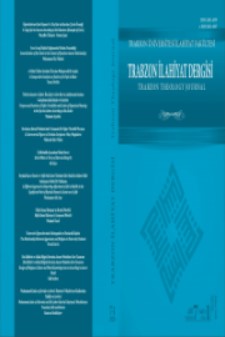Tefsirin Gayesi ve İşlevi: İbn Âşûr’a Göre Kur’an Lafızlarında Anlam Genişlemesinin İmkân ve Sınırları
Purpose and Function of Tafsir: Possibility and Limits of Expansion Meaning in the Qur’ān Letters According to Ibn Āshūr
Author(s): Mahmut AyyıldızSubject(s): Islam studies, Philology, Theory of Literature
Published by: Karadeniz Teknik Üniversites - İlahiyat Fakültesi
Keywords: Tafsīr, Ibn Āshūr; al-Tahrīr wa al-Tanwīr; Purpose; Function; Polysemy;
Summary/Abstract: Since the Qur’ān is the last divine message sent to mankind, it has a wide content that will bring those who are subordinated to it (self) to happiness in the world and in the hereafter from the day that the process of sending of revelation had been completed to the day of judgment. For, in terms of both the word and the meaning, the fact that the Qur’ān is the word belonging to Allah who knows all things whether they are in the past or future, hidden or obvious and has infinite knowledge is the clearest proof of this claim. The Qur’ān has a strong expression that will convey this content to its interlocutors in terms of language and wording. The science of tafsir, which examines the Qur’anic words in terms of the signification of meaning, aims to present this rich content that corresponds to the desire of Allah throughout the history. However, it will not be right to evaluate every information that had been declared with regard to the verses in tafsir literature within the desire of Allah. Indeed, some of these information has the aim to explain the meaning of the verse, while some of them consist of being detailed of the intention in the mind of the interlocutor from benefiting different examples of the sciences. In this context, the determinations and evaluations regarding the relationship between the meanings of the Qur’ānic words and the divinely aim will determine the function of the exegesis.
Journal: Trabzon İlahiyat Dergisi
- Issue Year: 7/2020
- Issue No: 1
- Page Range: 128-160
- Page Count: 33
- Language: Turkish

